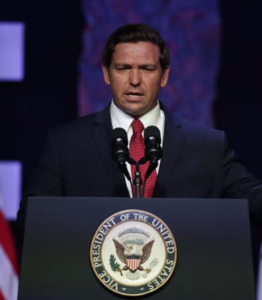By John Haughey
The Center Square
August 24, 2019 – 2:30 p.m.

Florida has become the 30th state to join the Electronic Registration Information Center [ERIC], a Washington, D.C.-based non-profit that uses information from motor vehicle departments, Social Security Administration records and other databases to cross-reference voter registration across member states.
“One of my administration’s top priorities is protecting the integrity of Florida’s elections, which is why joining ERIC is the right thing to do for our state as it will ensure our voter rolls are up-to-date and it will increase voter participation in our elections,” Gov. Ron DeSantis said Wednesday. “We are confident that by improving the accuracy of our voter rolls, we will reduce the potential for voter fraud.”
ERIC, which is governed by a board of directors consisting of elections officials from member states – its chair is Nevada Deputy Secretary for Elections Wayne Thorley – says on its website that it offers “a streamlined process of verifying voter eligibility less expensive and more accurate than previous systems.”
Membership allows Florida elections officials to crosscheck voter registration data with the other 29 member states to identify duplicate registrations and outdated records from voters who have moved or passed away.
According to the governor’s announcement, in addition to “enhancing the accuracy of voter rolls, ERIC also improves voter registration by providing information for member states to contact potentially eligible but unregistered voters with instructions on how to register to vote. The outreach to potentially eligible voters is conducted every two years ahead of each federal general election.”
“Supervisors of elections have long advocated for Florida to join ERIC as it is an incredible tool to help ensure our voter rolls are accurate,” Florida State Association of Supervisors of Elections President Tammy Jones said. “On behalf of all supervisors, I thank Gov. DeSantis for his tremendous leadership on this issue.”
Joining ERIC is among a series of actions taken since 2018 to enhance the security and sanctity of Florida elections following revelations by the FBI that Russian hackers infiltrated two Florida counties’ elections systems before the 2016 election.
DeSantis’ office said “millions” have been invested in election security since the 2016 election and, after elections were designated as “critical infrastructure” in 2017, the state received $14.5 million in federal election security grants for its 67 county election offices in 2018.
The state’s recently Fiscal Year 2020 budget allocates $2.8 million in cybersecurity grants for county elections offices and another $2.3 million in unexpended federal grant funds were authorized for redistribution, funneling $5.1 million for elections infrastructure enhancements ahead of the 2020 election.
In May, DeSantis issued a directive to Secretary of State Laurel Lee to initiate a review of elections systems security and cybersecurity throughout the state to “identify any weaknesses or vulnerabilities in Florida’s elections infrastructure.”
Although not directly related to the cybersecurity programs, ERIC’s emphasis on updating voter registration rolls is an effort to ensure the sanctity of elections and sustain voters’ faith in them.
According to ERIC, a 2012 Pew Research Center study found about one in eight voter registrations – as many as 24 million nationwide – was out of date, inaccurate or a duplicate. There were 1.8 million registered voters who were dead and nearly 3 million were registered in more than one state, Pew found.
President Donald Trump continues to claim millions of votes were cast illegally in the 2016 election, although 31 studies have found no link between duplicate voter registrations and fraud. A commission authorized by the president to ferret out voter fraud adjourned without finding any evidence to support his claim.
However, according to ERIC, when people move to another state or change their names, they often don’t notify their state’s voter registrars to remove their names from the local rolls. Unless someone notifies a local elections office that a voter has died, their names may stay on voter rolls for years.
